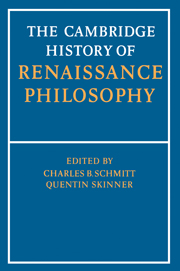Book contents
- Frontmatter
- Introduction
- PART 1 THE INTELLECTUAL CONTEXT
- PART 2 PHILOSOPHY AND ITS PARTS
- 6 Logic and language: Traditional logic
- 7 Logic and language: Humanistic logic
- 8 Natural philosophy: Traditional natural philosophy
- 9 Natural philosophy: The new Philosophy of nature
- 10 Natural philosophy: Astrology and magic
- 11 Moral philosophy
- 12 Political philosophy
- 13 Psychology: The concept of psychology
- 14 Psychology: The organic soul
- 15 Psychology: The intellective soul
- 16 Metaphysics
- 17 Problems of knowledge and action: Fate, fortune, providence and human freedom
- 18 Problems of knowledge and action: Theories of knowledge
- 19 Problems of knowledge and action: Epistemology of the sciences
- 20 Philosophy and humanistic disciplines: Rhetoric and poetics
- 21 Philosophy and humanistic disciplines: The theory of history
- PART 3 SUPPLEMENTARY MATERIAL
- Biobibliographies
- Bibliography
- Index nominun
- Index rerum
- References
18 - Problems of knowledge and action: Theories of knowledge
from PART 2 - PHILOSOPHY AND ITS PARTS
Published online by Cambridge University Press: 28 March 2008
- Frontmatter
- Introduction
- PART 1 THE INTELLECTUAL CONTEXT
- PART 2 PHILOSOPHY AND ITS PARTS
- 6 Logic and language: Traditional logic
- 7 Logic and language: Humanistic logic
- 8 Natural philosophy: Traditional natural philosophy
- 9 Natural philosophy: The new Philosophy of nature
- 10 Natural philosophy: Astrology and magic
- 11 Moral philosophy
- 12 Political philosophy
- 13 Psychology: The concept of psychology
- 14 Psychology: The organic soul
- 15 Psychology: The intellective soul
- 16 Metaphysics
- 17 Problems of knowledge and action: Fate, fortune, providence and human freedom
- 18 Problems of knowledge and action: Theories of knowledge
- 19 Problems of knowledge and action: Epistemology of the sciences
- 20 Philosophy and humanistic disciplines: Rhetoric and poetics
- 21 Philosophy and humanistic disciplines: The theory of history
- PART 3 SUPPLEMENTARY MATERIAL
- Biobibliographies
- Bibliography
- Index nominun
- Index rerum
- References
Summary
INTRODUCTION
The theory of knowledge, as a or the central branch of philosophy, is a post-Renaissance phenomenon that develops from certain critical movements in Renaissance thought. If epistemology deals with the three basic questions set forth in John Locke's Essay Concerning Human Understanding: What is the origin, the extent and the certainty of human knowledge?, these were not the central issues for most Renaissance thinkers. Most accepted Aristotle's explanation in De anima of how we gain information and form concepts, and Aristotle's account in the Prior and Posterior Analytics of how the concepts abstracted from sense experience are connected by logical inferences to provide knowledge.
Certain problems were raised in the Renaissance about whether the Aristotelian account could lead to ‘higher’ or ‘the highest’ knowledge, or whether it was adequate to account for religious knowledge. Various critics of Aristotelian thought challenged each element of Aristotle's account, his empiricism, his theory of concept abstraction and his theory of logical connections of concepts. In addition, radically different proposals were offered about how knowledge is acquired and what it is about, ranging from various Platonic views, to various claims about how to acquire esoteric knowledge, to doubts about whether any genuine knowledge could be acquired.
Although Renaissance philosophical interests dealt mainly with metaphysical and ethical issues, and with problems in logic and natural science, nonetheless some of the epistemological issues that were raised in discussing these matters led to the central problems of knowledge that philosophers have been struggling with from the time of Francis Bacon and Rene Descartes up to the present.
- Type
- Chapter
- Information
- The Cambridge History of Renaissance Philosophy , pp. 668 - 684Publisher: Cambridge University PressPrint publication year: 1988
References
- 2
- Cited by



